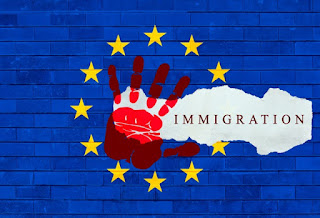What is Easter all about? For many, it is a much anticipated long weekend. For younger ones, it means Easter egg hunts, chocolate treats, bunnies and baskets. There is even the origin of the name ‘Easter,’ which is meant to be derived from the goddess Astarte.
Putting aside the folklore, the Easter holiday, including Good Friday and Easter Sunday, commemorates the most important event in Christendom, indeed, of history itself – and that is, the gospel of Jesus Christ.
We know that the word ‘gospel’ means ‘good news.’ The Apostle Paul, in his famous chapter on the resurrection in I Corinthians 15:3-6f, gives a wonderful summary of the gospel:
For I delivered unto you first of all that which I also received, how that Christ died for our sins according to the scriptures; 4And that he was buried, and that he rose again the third day according to the scriptures: 5And that he was seen of Cephas, then of the twelve: 6After that, he was seen of above five hundred brethren at once … (emphasis mine).
The key points of the gospel are:
Christ died,
Christ was buried,
Christ rose again on the third day,
There were many witnesses,
And all of this was according to the scriptures
Believe these simple statements (Romans 10:9-10), and receive Him as Saviour and Lord (John 1:12), and you have the new birth, forgiveness of sins, and the gift of eternal life.
In short, Easter is about the atoning death and glorious resurrection of Jesus Christ. Without this, there would be no forgiveness of sins, no justification, no new birth, no Christian faith and no Christian Church.
Why the Crucifixion?
The execution of Jesus of Nazareth was the worse miscarriage of justice in history, both from a Jewish as well as a Roman point of view. This man never sinned nor broke any laws during His entire earthly life. Yet, despite legal safeguards, He was sent to the cross while a seditious murderer named Barabbas was released in His stead.
The reason a holy God allowed for this horrific event had to do with redemption and salvation. Sin has a price and someone had to pay it – it could not be written off. Christ willingly paid that price that the unjust – namely all of us – could be made ‘justified’ (declared ‘righteous’). I Peter 3:18 puts it succinctly:
For Christ also hath once suffered for sins, the just for the unjust, that he might bring us to God, being put to death in the flesh, but quickened by the Spirit:
Another reason for Christ’s suffering and crucifixion was because of the Scriptures. Jesus Christ had a ‘high view’ of God’s Word (Matthew 5:18; 22:29; 26:54, 56; Mark 12:24; 14:49; Luke 24:27, 45; John 5:39). The Bible is all good, all glorious, all God. Totally inspired, wonderfully infallible, and gloriously profitable.
Jesus had a clear passion that the Scriptures must be fulfilled. The New Testament records how Christ fulfilled so many wonderful prophetic passages of the Old Testament in His suffering, death, and resurrection, the very things we remember at Easter.
Here is a partial list:
|
PROPHECY
|
OT Reference
|
NT Fulfillment
|
|
Betrayed by a close friend
|
Psalm 41:9
|
Luke 22:47
|
|
Betrayed for 30 pieces of silver
|
Zechariah 11:12
|
Matthew 26:14-15
|
|
Accused by false witnesses
|
Psalm 35:11
|
Mark 14:57-58
|
|
Answered His accusers by silence
|
Isaiah 53:7
|
Mark 15:4-5
|
|
Spat upon and struck
|
Isaiah 50:6
|
Matthew 26:67
|
|
Hated without a cause
|
Psalm 35:19
|
John 15:24
|
|
Vicarious sacrifice for sin
|
Isaiah 53:5
|
Romans 5:6-8
|
|
Crucified with criminals
|
Isaiah 53:12
|
Mark 15:27
|
|
His hands and feet were pierced
|
Zechariah 12:10
|
John 20:27
|
|
Mocked and sneered
|
Psalm 22:7-8
|
Luke 23:35
|
|
Reproached
|
Psalm 69:9
|
Romans 15:3
|
|
Prayed for His enemies
|
Psalm 109:4
|
Luke 23:34
|
|
Soldiers cast lots for His garment
|
Psalm 22:17
|
Matthew 27:35-36
|
|
Forsaken by God
|
Psalm 22:1
|
Matthew 27:46
|
|
None of His bones were broken (unusual at a crucifixion)
|
Psalm 34:20
|
John 19:32, 33, 36
|
|
His side was pierced
|
Zechariah 12:10
|
John 19:34
|
|
Buried in a rich man’s tomb
|
Isaiah 53:9
|
Matthew 27:57-60
|
|
Resurrected
|
Psalm 16:10; 49:15
|
Mark 16:6
|
The record is clear: crucifixion is a horrific way to die – agonisingly slow, totally humiliating, and unspeakably painful. Jesus Christ was willing to do all this for the sake of world redemption (Hebrews 12:2).
The Resurrection
The resurrection is the central event of sacred history. If you can prove the resurrection of Jesus Christ, then all other miracles in the Bible become believable, for the simple reason that Jesus believed in all of them, too.
One point believers and nonbelievers can agree on: the tomb of Jesus Christ was empty on the third day. The argument is why the tomb was empty. Let’s take a quick look at the ‘objections’ to the resurrection of Jesus.
Stolen body: Skeptics say that the disciples came by night while everyone slept and stole the body of Jesus, only to announce His resurrection later. How can this be? The disciples were very fearful and kept away from both Golgotha and the tomb. Peter, the spokesman, denied Jesus three times. Furthermore, the tomb had been sealed and guards posted outside (Matthew 27:66). How could these affrighted men pull off such an act of trickery, only to turn around and say ‘He is risen?’ After the resurrection, the chief priests and elders conspired to spread the lie that the body was stolen (Matthew 27:11-15).
Swoon theory: This teaches that Jesus did not die on the cross but only swooned. Then, in the coolness of the tomb, He revived and walked out. How could Jesus, having been scourged with the Roman cat-o-nine tails, endure 6 hours on the cross, be pierced on His side, be pronounced ‘dead,’ put in a dark tomb without food or water for 3 days, push away the stone and walk past the guards? It takes more faith to believe in the swoon theory than in the resurrection.
Wrong tomb: This says that the disciples went to the wrong tomb, found it was empty, and pronounced Christ as risen. Not even remotely plausible: Jesus’ tomb was close to where he was crucified (John 19:41-42) and the faithful women had made careful note where the tomb of Joseph of Arimathea was located. The latter, also, could verify the correct location of his tomb.
Spirit only: This theory teaches that the disciples saw only the ‘spirit of Jesus,’ but not the bodily person. Again, a ‘spirit Jesus’ would have to get up from the tomb, fold the grave clothes, push the rolling stone, walk past the guards, and then convince everyone He was alive. Yet, he said these words in Luke 24:39:
Behold my hands and my feet, that it is I myself: handle me, and see; for a spirit hath not flesh and bones, as ye see me have.
Verse 43 says He ate a broiled fish and honeycomb in their presence.
Hallucination theory: This teaches that the disciples merely ‘imagined’ Christ rose from the dead. There is no such thing as a ‘mass hallucination’ or ‘imagination.’
Only one other conclusion is possible: the tomb of Christ was empty because He rose from the dead! The grave clothes were folded in an orderly manner, the angels rolled away the stone, the guards became as dead men, and Jesus proceeded to show himself to those chosen by God.
The great physician and historian, Luke, who wrote the Gospel of Luke and Acts, put it very clearly in Acts 1:3:
To whom (the apostles whom He had chosen – verse 2) He also presented Himself alive after His suffering by many infallible proofs, being seen by them during forty days and speaking of the things pertaining to the kingdom of God (emphasis mine).
There were many sightings of the Risen Christ by many witnesses over a period of 40 days. This can not be a coincidence, and it totally disproves the above theories. Biblical references of the bodily resurrected Christ, include:
|
Appearance of the Resurrected Christ
|
Reference
|
|
Mary Magdalene, the first to see the Risen Christ
|
Mark 16:9; John 20:11-18
|
|
Seen by the other women
|
Matthew 28:8-10
|
|
Seen by Peter
|
Luke 24:34
|
|
Seen by the ten disciples
|
Luke 24:36-43; John 20:19-25
|
|
Seen by the eleven disciples, including ‘Doubting Thomas’
|
Mark 16:14; John 20:26-29
|
|
Seen by the disciples at the Ascension of Christ
|
Mark 16:19, 20; Luke 24:50-53; Acts 1:4-12
|
|
Seen by the disciples on the Emmaus Road
|
Mark 16:12,13; Luke 24:13-35
|
|
Seen in Galilee
|
Matthew 28:16-20; John 21:1-24
|
|
Seen by 500 people at once
|
I Corinthians 15:6
|
|
Seen by James and the apostles
|
I Corinthians 15:7
|
|
Seen by Paul on the Damascus Road
|
Acts 9:1-6; 22:1-10; 26:12-18; I Corinthians 15:8
|
The early church came into being because of a rock-solid conviction that Jesus Christ rose from the dead. They were even willing to suffer and die for this fact. Think about it? Who is going to risk their life for something they are uncertain about or know to be a lie? Answer: No one. Remember that skeptics have tried research in order to disprove the resurrection, only to end us as believers in Christ!
No Resurrection? Big Trouble!
A good place to understand the Resurrection is I Corinthians 15. We learn about the nature of the resurrected body, the surety of a coming resurrection, and the perils if there was no resurrection of Jesus.
Without Jesus’ resurrection, we would be in dire straits. Here is a catalogue of woes:
• Prophecy would be unfulfilled (Psalm 16:10);
• If there is no resurrection of the dead, then Christ did not rise, either (I Corinthians 15:13);
• Our preaching would be in vain (v. 14);
• Your faith in Christ and the gospel would be vain (v. 14);
• We would be false witnesses of the resurrection of Christ … if there is no resurrection of the dead (v. 15);
• Our faith would be futile and we would still in our sins (v. 17);
• Those who are ‘dead in Christ’ would be eternally lost (v. 18);
Have no fear … the gospel truthfully and victoriously proclaims that Christ is risen from the dead, and has become the first-fruits of those who have died (I Corinthians 15:20). His resurrection guarantees yours. The early church was founded on the Rock of Christ and the Resurrection, and has been flourishing ever since.
So as you celebrate this nice long weekend, remember that the very event it commemorates – the death and resurrection of Christ – has transformed history. Open up wide and it will transform you, too.






